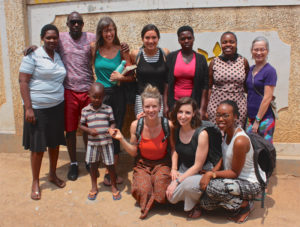Rosebud woman shares hope and love in Rwanda
By Laureen F. Guenther Times Contributor

Photo Courtesy of Jaala Cutbill
Cutbill was with the Hearts of Hope team, under HOPEthiopia/Rwanda. The team included six Canadian women, an American woman and a Rwandan woman, who went to nurture relationships with women in HOPEthiopia/Rwanda’s year-long tailoring program.
According to Glenda Dubienski, HOPEthiopia/Rwanda’s director of operations, most women in the tailoring program are orphaned genocide survivors, and have so little education they’re deemed unemployable. Many were raped, she added, and forced into prostitution, giving birth before their mid-teens. “Their prospects are slim.”
Cutbill and the team spent the first week visiting the 20 women, aged 16 to late 20s, about to begin the program. Most of their homes, she said, are “very tiny” and “very poor.
“We would just spend an hour and a half, two hours with them,” Cutbill said. “We were there to introduce ourselves, have them introduce themselves to us, and spend a bit of time welcoming them to the Hope family, and just share some blessing.”
The Hearts of Hope team shared Bible verses, encouragement, affirmation and prayer. They’d also hear their host tell stories about her own life.
The following week, the Hearts of Hope team took those 20 women on a day trip to Lake Muhazi. It was their first time meeting each other, and for most their first time outside Kigali. “We had a big buffet lunch down by the water, and the girls just got a chance to play and be free,” said Cutbill.
Then the team focused on the 20 women who entered the program last year and were graduating. They organized a graduation ceremony and took the graduates to Akajira Park, a wildlife reserve, giving many their first chance to see wildlife.
Cutbill believes the greatest difference they made was “listening, just hearing their stories, and acknowledging and validating what they went through. Feeling heard and feeling loved; I think they’re so alone that knowing that people actually care was probably a big deal.”
Cutbill quoted Dubienski: “We go to love on these women. And our model of therapy is relational.”
She added: “It’s a beautiful thing and it just seems too simple. But it really was so moving.
“A number of these women said, ‘This is the best day of our lives, having you guys here,’” she said. “How grateful they were to share their story with people who cared. It is such a simple, simple need and desire. But if you don’t have it, wow, do you appreciate it when it shows up.”
And why bring people from Canada and the United States to do it?
More than 60 per cent of Rwandans are between 16 and 35 years old, with most of the older generation, the nurturers, missing due to genocide, Dubienski said. Her vision for Hearts of Hope was for women with “an abundance of love to give, to come and love (and) nurture young women who were so desperate for parental love.
“Their sacrificial involvement speaks volumes to these women who have not only felt forgotten, (but also) abandoned,” Dubienski added.
She said a tailoring student once told her, “We believed what our communities told us… they said we are the despised. But through the love you’ve shown us, now we know the truth… we are the beloved.”
The Hearts of Hope women feel that impact too.
“Their sharing of their stories hit me in a way that was devastating and beautiful,” Cutbill said. “I spent time with women from some of the most heart-wrenching backgrounds, and I learned about generosity and kindness and faith. I can be so much more generous with everything; with myself, with my time, with my material things. These women have nothing, and they are showing me how to be generous.
“I have such an outpouring of love in my life,” Cutbill added. “I have so much love that there is enough to share. There is more than enough to bring across to any part of the world.”
She wants to inspire others with that awareness.
“When we’re so gifted with the love and the things that we have in our life, it just seemed like such a necessary thing to go share that,” she said.
“Something as simple as spending time with someone and listening. And that doesn’t have to be across the country, or across the world. That can be in your very own community.”
Cutbill doesn’t want her life in Canada to go back to normal. Her connection with Rwanda may not be over either.
“As I said goodbye to everybody at the airport, I was like, I’ll probably be back here,” she said.
“They kind of steal a bit of your heart.”
